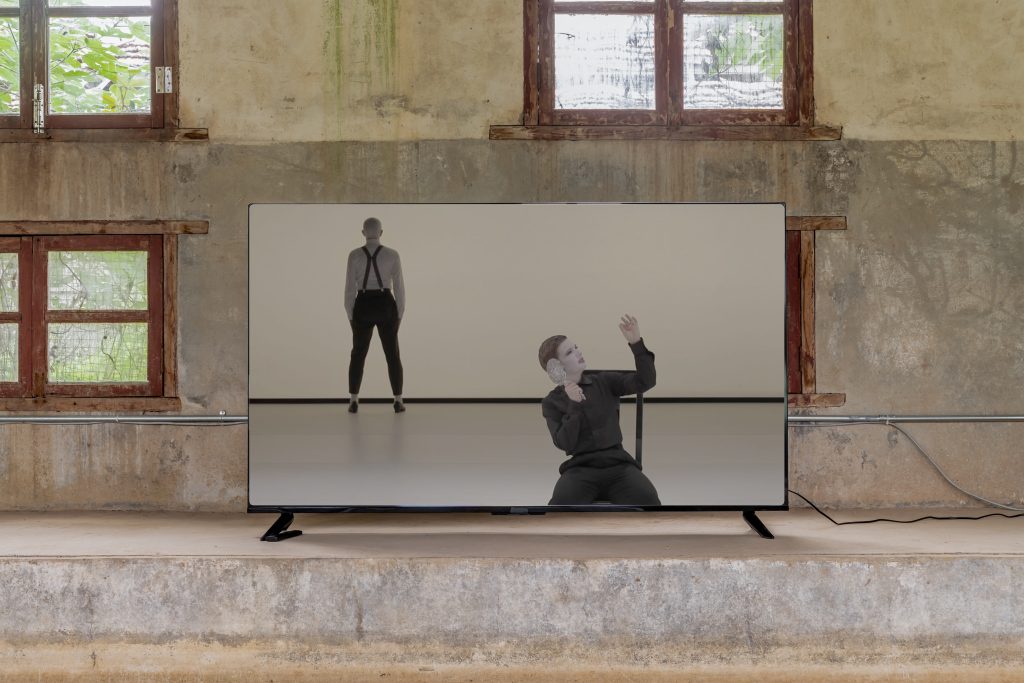
Branko Milisković
HERR MILISKOVIC (Life of an Intruder)
2014
Viedo
60’00’’
Belgrade born visual and performance artist of a younger generation had a premiere on the 16 January 2014 of his new production entitled HERR MILISKOVIC (Life of an Intruder) at Kampnagel theatre in Hamburg. This piece symbolizes two entities of his own body, asking personal as well as widely notorious social questions. While observing political connotations of The Body, Milisković intends that, by dividing his own-self into two entities, achieve some other forms of hybridity, establishing a bizarre fusion between man and women, animal and machine. In this production, Miliskovic collaborates with German performer and theatre director Helen Schröder who will be the other side of Miliskovic, while Branko Miliskovic himself represents his own irrational, androgenic, queer, promiscuous and socially intolerable body. HERR MILISKOVIC is ageless, genderless with an unspecified socio-political declaration, leaving somewhere in-between, somewhere on the way, but basically levitating. Performance “Herr Miliskovic” contains elements of contemporary choreography, dance, hardcore performance, cabaret, and opera. The main premise is particular relation, co-operation as well as conflicts between two different entities of Branko Miliskovic, constant socio-political arguments and finally the question “Who has committed Genocide?” Visually and structurally “Herr Miliskovic” is not a historical documentary theatre piece nor pamphlet theatre but rather more surreal nightmare of dreamlike collages using a special language of symbols, associations often without any logical order. Situations in this piece are intertwining each other, often dislocated occasionally reappearing, mainly following a philosophy of David Lynch by whom many everyday situations are often senseless and irrational and therefore very justified. Vocal parts in HERR MILISKOVIC are very protruding. Singing or speaking out certain phrases goes repetitively, very often in full voice up to ten minutes in length without break, causing a hypnotic effect of mantra. As Kampnagel has stated in its program Jan-Feb 2014, in his gracefully controversial performances, Miliskovic captures the audience with a combination of his “specific charm” and “disarming presence”(2013).
About Branko Milisković:
Branko Milisković [Бранко Милисковић] b.1982 in Belgrade, Serbia. Born in Former Yugoslavia he was the last generation of Marshall Tito’s Pioneers. In 1989 Yugoslavia broke up and he has started his primary school passing through the period of isolation, embargo, inflation, and devastation of his country. After having completed the secondary school for Architecture, Milisković studied Polytechnic High School (Industrial Design) and Faculty of Fine Arts, class of Mrđan Bajić, department of Sculpture in Belgrade, Serbia. In 2007 he has received the Dutch scholarship HSP Huygens and continued his Bachelor at the Royal Academy of Arts in The Hague, The Netherlands and obtained his degree in 2009. Milisković has earned his Master degree from Hochschule für Bildende Künste, Hamburg, class of Jeanne Faust (2012). He is a member of ULUS (Association of Fine Artists of Serbia) since 2018. His work have been shown internationally such as at Reims Scenes d’Europe at La Comedie de Reims, France; CSW/CoCA, Torun, Poland; G12HUB, Belgrade, Serbia; solo productions at Kampnagel, Hamburg, Germany; Les Halles, Brussels, Belgium; Zeitraumexit, Mannheim, Germany; Kaai studio, Brussels, Belgium; CIRCA art actuel, Montreal, Canada; LADA, London, UK; YFV, Seattle (WA), The Tank, NYC, USA; 57th October Salon, Belgrade, Podroom Gallery of Cultural Centre of Belgrade, Center for Cultural Decontamination, Serbia; Croatian Radio 3, Zagreb etc. Branko Milisković was performing and exhibiting in Venice, Turin, Alba (Italy), Hamburg, Berlin, Gießen, Baden-Baden (Germany), Brussels (Belgium), Paris, Marseille, Reims (France), Krems, Graz (Austria), Belgrade, Subotica (Serbia), Sofia (Bulgaria), Tel Aviv (Israel), Moscow (Russia), Piotrkow Trybunalski, Torun, Lublin (Poland), Winterthur, Geneva (Switzerland), Turku, Helsinki (Finland), Trondheim (Norway), The Hague, Amsterdam, Rotterdam, Utrecht, Eindhoven, Haarlem, Arnhem, Den Bosch, Roermond (The Netherlands), Aberdeen, London (UK), Montreal, Edmonton (Canada) and New York, Chicago, Seattle (USA).
